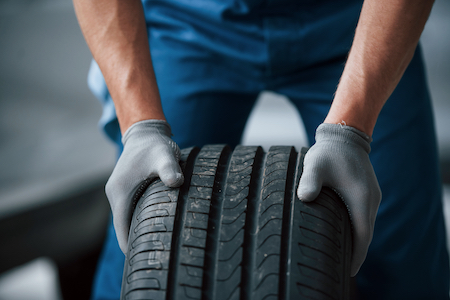Living in Colorado can give you a wide array of environmental challenges, sometimes all in the same day. Statistics show temperatures have climbed as high as 115 degrees Fahrenheit and dipped as low as -61. We’ve had more than 75 inches of snow in a 24-hour period, and have had hailstones as large as 4.83 inches in diameter.
Stick around, and you’ll see it all.
But those kinds of variances can be hard on your tires. What do cold and heat do to tires? Should you be more careful in certain driving conditions? What puts your tires at risk?
Why tires are susceptible to changes in weather conditions
What are tires made of? Most people would say: rubber. That’s only partially correct.
Rubber is one of the main materials used in tire production, but there are as many as 200 different components combined to create new tires. Steel, nylon, silica, polyester, carbon, petroleum, as well as natural and synthetic rubber are all used to make tires stronger, better. It’s complex engineering to make tires do what they do best.
The outside tread creates traction and mileage. Inside the tire provides stability and strength. Together it helps your vehicle perform well out on the open road, as well as keep you safe no matter where you drive.
Tires are often created with certain performance requirements in mind. That’s why you’ll find a variety of types: snow, all-season, performance, and traction.
Depending on what tires are mounted to your vehicle will determine how susceptible they are to the driving conditions. Cold weather decreases tire pressure while hot weather increases.
As temperatures outside rise, the air in your tires increases in volume. As temperatures fall, the air volume in the tires decreases. That’s why your car’s computer module may indicate your tires are low in pressure after a plunge in temperatures outside. In general, tire pressure usually drops 1 to 2 psi for every 10 degrees the temperature drops. That’s also why air pressure will rise as your tires warm up as you drive.
Every tire manufacturer produces tires with a recommended psi. This psi tells you the optimal pressure for your tires and your car. However, this psi is set for cool tires. If you check your tire inflation at the filling station after your tires have warmed, it will be a different reading from when they were cool. It’s best to check your tires at home, if possible, before your tires have a chance to warm up.
Summer driving
As the temperatures continue to climb in summertime, your tires increase in volume and may overinflate. Most technology systems are wired to tell you when your tires are underinflated, but not when they are overinflated. This is why it’s important to test your tires manually periodically, especially with record-breaking heat or if you’re driving more than usual.
This can be especially true if you take long trips, or are carrying heavy loads. This is why tires blow on occasion.
Coupled with improper inflation is weakened tread. Tire tread is measured in 1/32 of an inch. If you have uneven wear patterns in the tread of more than 2/32 of an inch, it’s time to replace your tires. You can also do the penny test. Place a penny in a shallow groove on a tire with Lincoln’s head facing down. Can you see the top of his head? That means the tire tread is too shallow, and your tires are considered worn. The tire tread is 2/32 of an inch or less, and it’s time to replace your tires.
Winter driving
In winter, the opposite is true. Your tires may become underinflated in cold weather, and the tire pressure may drop accordingly. Unlike in summer months, air pressure readings will be accurate. Your vehicle’s computer system will be more likely to pick up on proper inflation of your tires.
That doesn’t mean you shouldn’t still check it manually on your own from time to time. Don’t forget your spare.
You should also pay attention to driving conditions, and perform a manual check if problems arise. Snow and ice wreak havoc on our roads. Potholes, hitting curbs, icy terrain – it can all wear your tires down. Be conscious of any potential problems that may impact your tires, and have them checked before you continue driving.
Heat and cold impact tires. Don’t drive if you suspect a problem.
Tires are designed for a multitude of purposes:
- They support and cushion the weight of a vehicle
- They absorb the shocks occurring as you drive on a road
- They provide traction in different driving conditions
- They add torque and braking force as they connect to the pavement
- They allow you to easily keep control of the vehicle as you change and move the direction in which you travel
Without high-quality tires, you’ll be putting you and those around you at risk.
You should never drive on bad tires. It’s something you should check on a regular basis to ensure they are in good shape.
However, your tires wear and performance can change quickly in different situations.
If tires lack tread, you can pick up on it with visual checks. But if they are over or underinflated, it may be more difficult to notice as you drive.
Awareness is key in keeping your vehicle safe and under control.
If tires are weakened or lack tread, they are more vulnerable to the dangers of the road. Punctures and blowouts can happen more frequently, putting you and your passengers at risk.
Don’t wait to change your tires, replace them if damaged, or even have them checked if you suspect a problem. The sooner you react, the better your chance of fixing the problem, and possibly adding more life to your tires. Proper inflation can add many more miles of life to your tires.
How can we help you maintain your vehicle?

